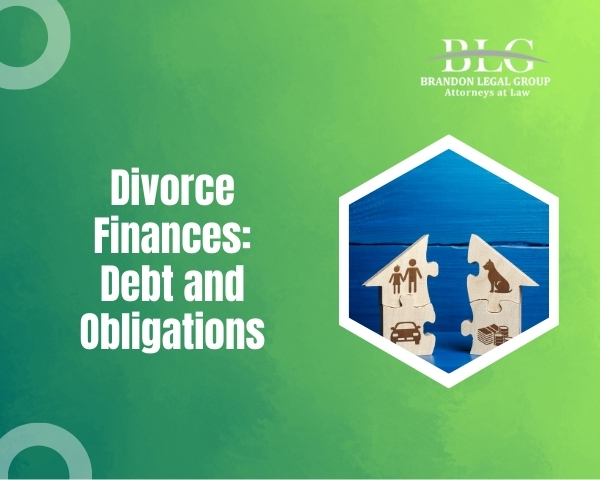Divorce not only marks the end of a marriage but also the beginning of a new financial reality. With so many assets and debts to consider, it’s crucial to understand how these financial obligations are divided and handled after a divorce. Failing to properly address debt division can lead to long-term financial consequences that can hinder your ability to move forward after the dissolution of your marriage.
The Importance of Proper Debt Division
Ensuring that debts are divided equitably is essential for a fair and just divorce settlement. Failing to properly address debt division can lead to long-term financial consequences that can hinder your ability to move forward after divorce. By understanding the key considerations and seeking legal guidance, you can protect your financial interests and achieve a favorable outcome.
Marital Debt vs. Separate Debt
It’s important to distinguish between marital debt and separate debt during the divorce process. Marital debt refers to any debts incurred during the marriage, such as credit card balances, mortgages, or personal loans taken out jointly. These debts are typically considered shared obligations and are subject to division during the divorce.
On the other hand, separate debt refers to debts incurred before the marriage or solely by one spouse, such as student loans or personal credit card balances. These debts are generally considered the sole responsibility of the spouse who incurred them.
The following is a DRAMATIZATION AND IS NOT AN ACTUAL EVENT: Imagine a scenario where one spouse had significant credit card debt from before the marriage, while the other spouse had taken out a personal loan during the marriage to fund a home renovation. In this case, the credit card debt would likely be considered separate debt, while the personal loan would be classified as marital debt and subject to division.
Equitable Distribution of Debt
In most states, the division of marital debt follows the principle of equitable distribution. This means that debts are divided fairly, taking into account various factors such as the income and earning potential of each spouse, the length of the marriage, and the contributions made by each partner during the marriage. State laws play a crucial role in determining the division of assets and liabilities during a divorce, ensuring a fair and equitable distribution based on the specific legal framework and guidelines of each jurisdiction.
The following is a DRAMATIZATION AND IS NOT AN ACTUAL EVENT: Consider a situation where one spouse has a higher income and earning potential than the other. In this case, the court may assign a larger portion of the marital debt to the higher-earning spouse to ensure an equitable distribution of financial obligations.
Secured Debts (Mortgages, Auto Loans)
Secured debts, such as mortgages and auto loans, are typically tied to specific assets. During a divorce, these debts must be addressed carefully. Potential options include refinancing the loan to remove one spouse’s name, selling the asset to pay off the debt, or one spouse assuming full responsibility for the debt and keeping the associated asset.
The following is a DRAMATIZATION AND IS NOT AN ACTUAL EVENT: Let’s say a couple owns a home with a remaining mortgage balance. One option could be for one spouse to refinance the mortgage solely in their name, while the other spouse receives their share of the home’s equity as part of the divorce settlement.
When a couple gets divorced, deciding who gets the house or how to split its value can be tricky. The rules depend on where they live and things like who bought the house, who paid for it, and what’s best for their kids, so they can figure out a fair way to handle it.
Unsecured Debts (Credit Cards, Personal Loans)
Unsecured debts, such as credit card balances and personal loans, are not tied to specific assets. These debts are typically divided equitably during the divorce process. It’s important to have clear agreements and documentation outlining each spouse’s responsibility for repayment to avoid future disputes or negative impacts on credit scores.
The following is a DRAMATIZATION AND IS NOT AN ACTUAL EVENT: Suppose a couple has accumulated significant credit card debt during their marriage. The divorce agreement may stipulate that each spouse is responsible for paying off a portion of the total balance based on their respective incomes or other factors.
Spousal and Child Support Obligations
In addition to debt division, divorcing couples may also face financial obligations in the form of spousal and child support. These obligations are determined based on factors such as the income levels of each spouse, the custody arrangement for any children, and the standard of living established during the marriage.
When getting a divorce, making a budget is really important to see if you can afford to keep the house, pay for child support, and cover other expenses, helping you plan your money wisely during this big change.
Failing to meet these obligations can have serious legal consequences, including wage garnishment, tax refund interceptions, and even potential imprisonment. It’s crucial to understand and comply with any spousal or child support orders to avoid further legal complications and financial strain.
The Value of Legal Guidance
Navigating the complexities of debt division and financial obligations during a divorce can be overwhelming. With the guidance of an experienced divorce attorney, you can ensure that your financial interests are protected, and your obligations are fairly divided.
A skilled divorce attorney will analyze your unique situation, provide expert advice on debt division strategies, and advocate for a fair and equitable settlement that considers your long-term financial well-being. They will also ensure that any spousal or child support obligations are properly calculated and enforced.
Conclusion
Divorce not only marks the end of a marriage but also ushers in a new financial reality. Properly addressing debt division and financial obligations is crucial to securing a fair and equitable settlement that allows you to move forward with confidence.
Remember, failing to properly handle these matters can lead to long-term financial consequences that can hinder your ability to rebuild your life after divorce. Don’t navigate this complex process alone.
Take the first step towards protecting your financial future by contacting our legal office for a consultation. Our team of experienced divorce attorneys will provide the guidance and representation you need to ensure that your rights and financial interests are safeguarded throughout the divorce process.
FAQs
1. How is marital debt divided during a divorce?
Marital debt, which refers to debts incurred during the marriage, is typically subject to equitable distribution during a divorce. This means that the debt is divided fairly between the spouses, taking into account various factors such as income levels, earning potential, and contributions made during the marriage.
2. What happens to secured debts like mortgages and auto loans?
Secured debts are tied to specific assets, such as a home or a vehicle. During a divorce, these debts may be addressed through options like refinancing the loan to remove one spouse’s name, selling the asset to pay off the debt, or one spouse assuming full responsibility for the debt and keeping the associated asset.
3. How are unsecured debts like credit cards and personal loans handled?
Unsecured debts, such as credit card balances and personal loans, are typically divided equitably during the divorce process. It’s important to have clear agreements and documentation outlining each spouse’s responsibility for repayment to avoid future disputes or negative impacts on credit scores.
4. What are spousal and child support obligations, and why are they important?
Spousal and child support obligations are financial responsibilities determined during a divorce based on factors such as income levels, custody arrangements, and the standard of living established during the marriage. Failing to meet these obligations can have serious legal consequences, including wage garnishment, tax refund interceptions, and even potential imprisonment.
5. Why is it essential to seek legal guidance during a divorce?
Navigating the complexities of debt division and financial obligations during a divorce can be overwhelming. An experienced divorce attorney can analyze your unique situation, provide expert advice on debt division strategies, and advocate for a fair and equitable settlement that considers your long-term financial well-being. They can also ensure that any spousal or child support obligations are properly calculated and enforced.
Protect Your Financial Future: Contact Our Legal Office Today
Divorce is a life-changing event that can have significant financial implications. Don’t leave your financial well-being to chance. Contact our legal office today for a consultation, and let our team of experienced divorce attorneys guide you through the complexities of debt division and financial obligations.
Our attorneys will listen to your unique situation, provide expert advice, and fight tirelessly to ensure that your rights and financial interests are protected throughout the divorce process. We’ll work diligently to secure a fair and equitable settlement that considers your long-term financial stability.
Take the first step towards a secure financial future by calling us at (813) 902-3576 or visiting our website at BrandonLegalgroup.com. Don’t wait – your financial well-being deserves the utmost attention and care.
